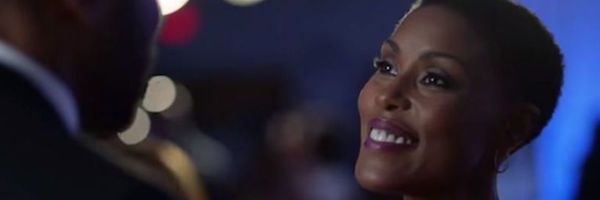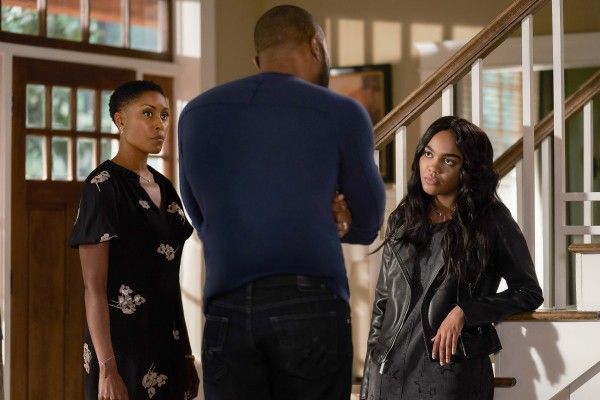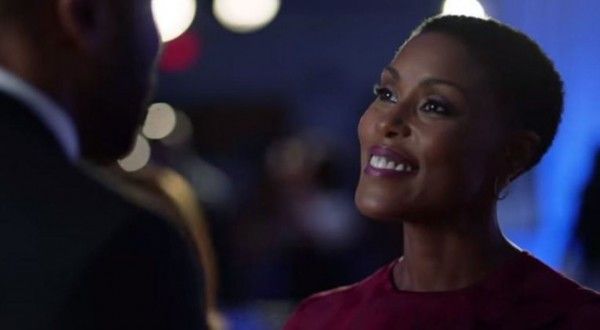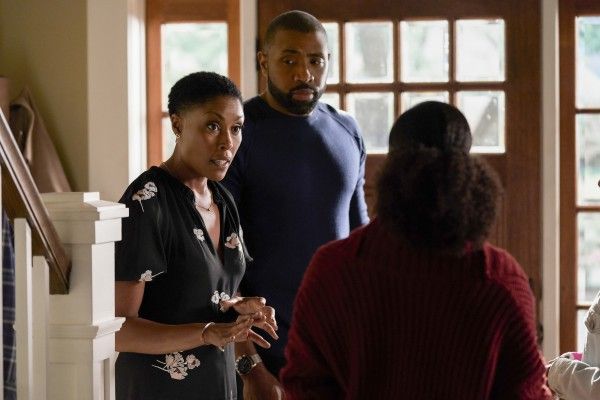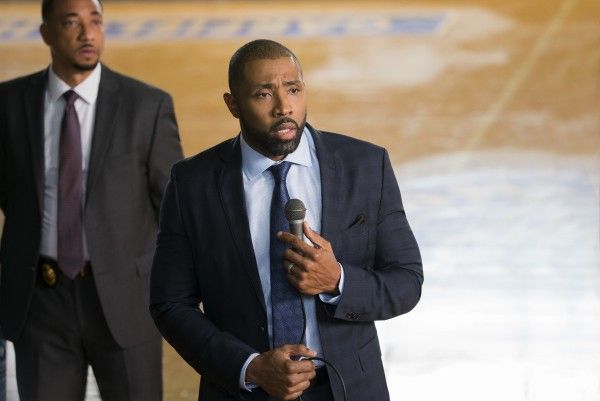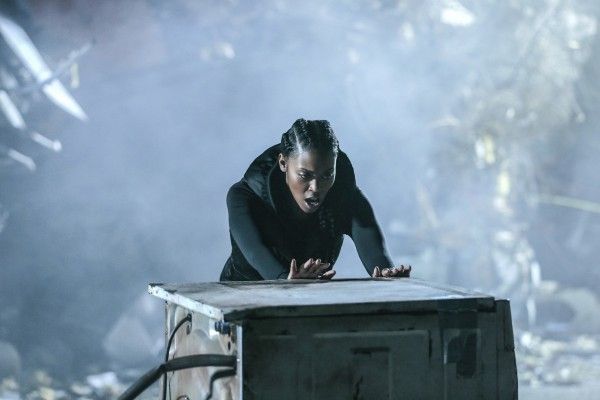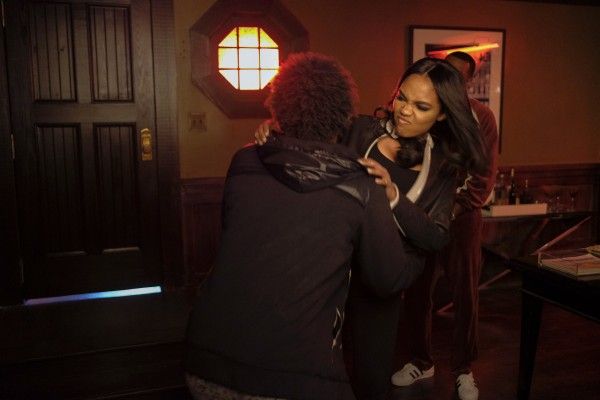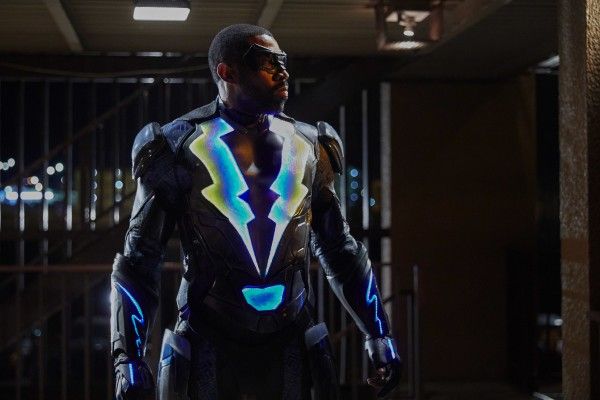A few weeks ago, a group of journalists were invited to drop by the set of Black Lightning in Atlanta to talk to the cast and creator about the CW's latest superhero show -- one that really doesn't feel like a superhero show at all, in the best of ways. One of the big teases we got at the time was about Green Light, a highly addictive drug that was going to become a plague upon the people of Freeland.
Christine Adams, who plays Lynn Pierce, spoke to me in a one-on-one interview not only about the dilemma Lynn faces in trying to keep her family together while acknowledging that the city needs Black Lightning to return, but also how she might deal with her daughters getting powers as well. But one of the most exciting teases is how Lynn will also play a pivotal role in the understanding of Green Light, as well as uncovering how Jefferson first got his powers.
Adams also spoke about Lynn's tension with Gambi over what's best for Jefferson, how much she knows about Jefferson's past with Tobias, as well how showrunner Salim Akil assured her that her character was not going to become the typically forgotten wife just because she doesn't have powers. (Finally!)
QUESTION: Lynn has taken such a hard line with Jefferson in the past being Black Lightning, but now that her daughters have been in peril, will that change?
ADAMS: Yeah, it’s sort of the eternal conflict that they’re in, because she loves and respects Jeff for who he is and what his reasons for wanting to go out there and be Black Lightning — they’re all good reasons! — but she, you know, even back then when they were together there was always a sense of ‘is he going to come home, what state is he going to come home in, is he going to come home alive,’ he was endangering himself every evening, and I think that she always felt like it was sort of questionable, what he was going to be drawn to, more like an addiction than just going out and doing good in the world. But obviously when her daughters are in danger, then it’s a different set of circumstances.
I think what’s good about the show is that it’s not always black and white, there’s always grey areas, and as we get later on in the series and Anissa is starting to discover her powers, and Jennifer is too, it’s going to be difficult, because on the one hand she doesn’t want them going out and doing what her dad did, because she knows how dangerous that can be. But on the other hand, she knows that she doesn’t have the power to stop them. But she knows that she and Jeff have raised them to go out and do good in the world; that’s kinda been their overarching message for these girls, to go out and do good, use whatever power and intelligence you have to do good. So there’s a real conflict there with a constant push and pull, so I think that’s kind of an interesting thing to play.
On the one hand she’s saying you can’t do this, but on the other she understands why and if anyone can you can, and on another level her job as a scientist and a medical professional means that she is sort of curious to figure out what this puzzle is, and wait a second how did they get these powers and how do they work and how can I help them? And also, I’m the only one who can be there for them when they come home battered and bruised, because they can’t go to a regular hospital or urgent care, just pop in and … because there are things happening with their body that just can’t be know by regular people. So she has to be there.
Often in these shows, if characters don’t have powers, the writers don’t know what to do with them. What I like about Black Lightning is that Lynn seems very proactive in battling alongside her family, but in a different way, one the show is actually sensitive to.
ADAMS: Totally, that’s been one of the things that Salim has been really good at, and so often with these shows the wife or the mother just becomes a kind of secondary character that turns up in a superficial way. And actually with Lynn, again, you see her trying to solve the puzzle and put the pieces together and dig into the past and dig into how Jefferson became who he is. So you’ll start to see her relationship with Gambi, and how that starts to grow and what that really means, and their conflict and how they’re adversaries, and enemies but friends. So she becomes even more of the fabric of the story rather than less, which is great.
Can you talk about Lynn’s involvement with Green Light?
ADAMS: Yes, so Green Light is obviously this drug that’s kinda part of the community in Freeland and has been for a long time, and in some ways related to how Jeff got his superpowers. And we don’t know how directly yet, but we’re starting to get a sense, and Lynn gets a sample of this Green Light and starts to break it down and the molecular compound of it, and starts to see similarities in what’s in it and what’s happening with Jeff. So she’s the one who starts to unlock this initial mystery, and you’ll see that Green Light goes way back, and is way more complex and intricate and devastating in a way that’s so interesting. When I read it in the script I was like oh my God, this is brilliant. And it’s still rooted in a reality, even though it’s this thing that superheroes have or maybe have ingested or imbibed in some way, it still feels like something that you’ve seen in the newspaper or that you’ve read about in the way that it comes into the community and that it dominates the community.
Does Lynn know the full extent of Jefferson's history with Tobias?
ADAMS: Yes, she knows. She more or less … aside from Gambi, who knows everything, she knows kinda the most out of … she’s as close to being the audience in the sense of what she actually knows, who Tobias is, how he features in Jefferson’s life, and how he ultimately is the reason for Jefferson becoming who he is. But at the same time she’s very kind of careful to point out that that was then and this is now, and it’s time to move on. That yes, this happened, but you’ve got to think about moving forward. So she knows about it, she understands it, but I don’t know that it’s something that she wants to revisit, and she doesn’t want Black Lightning to revisit, and she definitely doesn’t want her children to revisit. She doesn’t have a lot of choice, unfortunately!
Do you think that’s her biggest challenge this season, just coming to terms with that?
ADAMS: Absolutely, the biggest challenge is going to be trying to … what do you do when the people you love are ultimately going out and being heroic, and if your husband or wife is a firefighter or a policeman or serving in the military, and you really love and you respect them, but you really are terrified. You’re going to spend every night, as they go out and do what they do, it’s a night that you don’t sleep. But also you know that your children are as you raised them … we have an episode, I think it’s called “When the Apple Falls,” and you know these girls are their father’s children. They want to do right and they want to use whatever powers and skills they have — be it superpowers, or as teachers, educators, athletes, social educators — they want to go out in the world and make an impact, and that’s exactly how we raised them. And it’s a real double-edged sword and it’s very bittersweet, but she is going to have to come to a place of … peace isn’t the right word … acceptance.
What has it been like to be a part of this series in terms of representation?
ADAMS: One of the things that Salim has been very adamant about from Day 1 is that he really wanted this to be a black show. Not in a way that would alienate a white audience, because I think a lot of things in our show would resonate with audiences whatever color they are, but I think in a sense of giving people context for what’s happening in black culture right now, and sort of historically, and I think we’ve gotten so used to see a black character on a show going out and doing something wrong, and it’s just because he’s from the ghetto, but nobody just does that, people are shaped for a certain reason, and I think to give people a context and to give people a real perspective can only bring about empathy and compassion. And I think we need more people to connect to that, that’s just so important.
We’re in this very divisive time, and I think we really need to give people some understanding. And also I think it’s so important particularly for African American women to see girls on screen that they can relate to. Traditionally in the comic book world, we never see that. We’re talking about Black Lightning, and what about Thunder? And we’ve see Wonder Woman and everyone’s so excite and I’m happy for that. But when I go into a bookstore I want my children to see something that looks like them, when they go into the cinema that’s what I want them to see. It’s important. Representation is so important, and I think what we do really well in the show is that we show the diversity of African American culture, and there are lots of different kinds of black people in the world.
I think traditionally television stays within a very narrow margin. And not that those shows aren’t enjoyable, but that’s what’s different about our show. We’re seeing educated African Americans, or people who have grown up in a certain way and transformed their lives, for the good or for the bad, and I think just getting that really brand spectrum is something we haven’t see before. Good TV is good TV regardless, whatever color you are.
Black Lightning airs Tuesday nights on The CW

